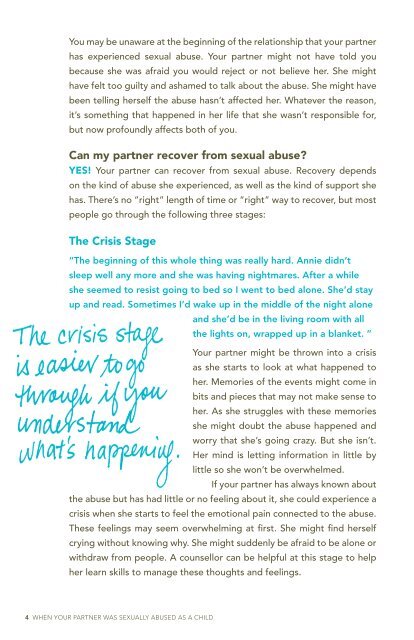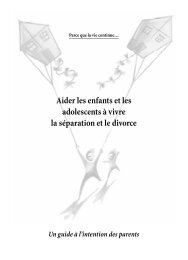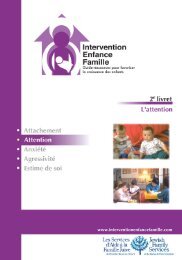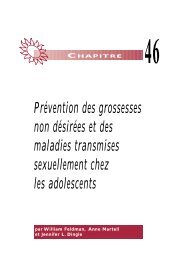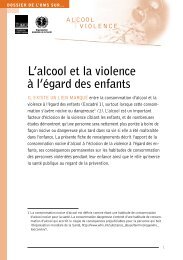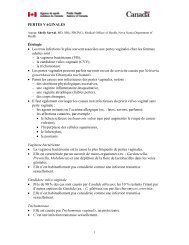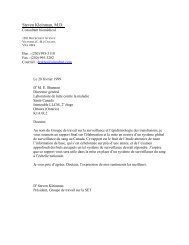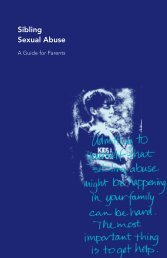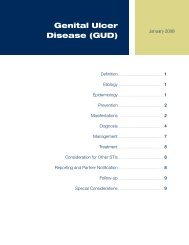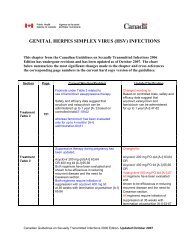When Your Partner Was Sexually Abused as a Child
When Your Partner Was Sexually Abused as a Child
When Your Partner Was Sexually Abused as a Child
You also want an ePaper? Increase the reach of your titles
YUMPU automatically turns print PDFs into web optimized ePapers that Google loves.
You may be unaware at the beginning of the relationship that your partner<br />
h<strong>as</strong> experienced sexual abuse. <strong>Your</strong> partner might not have told you<br />
because she w<strong>as</strong> afraid you would reject or not believe her. She might<br />
have felt too guilty and <strong>as</strong>hamed to talk about the abuse. She might have<br />
been telling herself the abuse h<strong>as</strong>n’t affected her. Whatever the re<strong>as</strong>on,<br />
it’s something that happened in her life that she w<strong>as</strong>n’t responsible for,<br />
but now profoundly affects both of you.<br />
Can my partner recover from sexual abuse?<br />
YES! <strong>Your</strong> partner can recover from sexual abuse. Recovery depends<br />
on the kind of abuse she experienced, <strong>as</strong> well <strong>as</strong> the kind of support she<br />
h<strong>as</strong>. There’s no “right” length of time or “right” way to recover, but most<br />
people go through the following three stages:<br />
The Crisis Stage<br />
“The beginning of this whole thing w<strong>as</strong> really hard. Annie didn’t<br />
sleep well any more and she w<strong>as</strong> having nightmares. After a while<br />
she seemed to resist going to bed so I went to bed alone. She’d stay<br />
up and read. Sometimes I’d wake up in the middle of the night alone<br />
and she’d be in the living room with all<br />
the lights on, wrapped up in a blanket. ”<br />
<strong>Your</strong> partner might be thrown into a crisis<br />
<strong>as</strong> she starts to look at what happened to<br />
her. Memories of the events might come in<br />
bits and pieces that may not make sense to<br />
her. As she struggles with these memories<br />
she might doubt the abuse happened and<br />
worry that she’s going crazy. But she isn’t.<br />
Her mind is letting information in little by<br />
little so she won’t be overwhelmed.<br />
If your partner h<strong>as</strong> always known about<br />
the abuse but h<strong>as</strong> had little or no feeling about it, she could experience a<br />
crisis when she starts to feel the emotional pain connected to the abuse.<br />
These feelings may seem overwhelming at fi rst. She might fi nd herself<br />
crying without knowing why. She might suddenly be afraid to be alone or<br />
withdraw from people. A counsellor can be helpful at this stage to help<br />
her learn skills to manage these thoughts and feelings.<br />
The crisis stage is e<strong>as</strong>ier to go through if you understand what’s happening.<br />
One way to fi nd out is to call a sexual <strong>as</strong>sault centre and talk to a counsellor.<br />
They can explain more about what your partner is going through and will<br />
give you some ide<strong>as</strong> on how to handle it.<br />
The Middle Stage<br />
“She kept digging into her p<strong>as</strong>t. I thought it would never stop. It<br />
w<strong>as</strong> <strong>as</strong> if she had to go back to all the important times and people in<br />
her life and look at them again and again. She had to see what her<br />
childhood w<strong>as</strong> really like; what her family<br />
w<strong>as</strong> really like.”<br />
<strong>When</strong> your partner decides to deal with the<br />
abuse, she’ll enter a stage of hard emotional<br />
work. She will struggle with details of the<br />
abuse, struggle to express her feelings about<br />
it, and to integrate the memories. This means<br />
she h<strong>as</strong> to acknowledge how deeply she h<strong>as</strong><br />
been affected by the abuse. She’ll experience<br />
emotional upheaval which may include grief<br />
and anger. However, she’ll probably be<br />
relieved, too, when some of her feelings and<br />
behaviours start to make sense to her.<br />
Although you might wish your partner<br />
would hurry and get on with recovery, she can<br />
do it only when she’s ready. If she’s worried<br />
about whether she can do it, encourage her to talk to a counsellor, or<br />
do some reading. If your partner is anxious about how it will affect your<br />
relationship, you could talk to a counsellor together about concerns and<br />
about what you might do to help.<br />
Don’t pressure your partner. The decisions along the way aren’t e<strong>as</strong>y<br />
and your partner must make them for her own re<strong>as</strong>ons, not to ple<strong>as</strong>e you.<br />
If you feel impatient or frustrated, talk to a counsellor or fi nd a support<br />
group for yourself.<br />
4 WHEN YOUR PARTNER WAS SEXUALLY ABUSED AS A CHILD A Guide for <strong>Partner</strong>s 5


